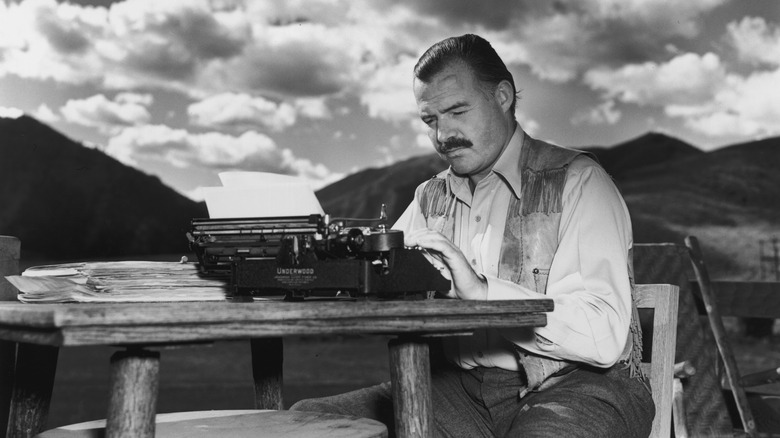Ernest Hemingway's Favorite Meal Was Also His Last
Ernest Hemingway's last meal was a New York strip steak with a baked potato, Caesar salad, and a glass of Bordeaux: Classic yet elevated without being fussy — which, in many ways, is also how he wrote. Hemingway ordered the meal, reportedly his favorite, from Michel's Christiania Restaurant in Ketchum, Idaho, on June 1, 1961. He and his fourth wife, American journalist Mary Welsh Hemingway, sat at "their" table (they were regulars) mere days after Hemingway was discharged from the Mayo Clinic psychiatric ward following a seven-month treatment for depression.
Later that same night, Hemingway died by suicide in the wee hours — a Sunday morning – wearing blue pajamas, a plaid bathrobe tied shut, and moccasin slippers in the 5-by-7 foot oak-paneled foyer of his Idaho home at 61 years old. Hemingway's father Clarence also took his own life in 1928, and his grandfather, brother, sister, and granddaughter also died by suicide. Throughout his life, Hemingway was a known gourmand with a pious appreciation for Cuban cigars, Marennes-Oléron oysters, and stinky, runny Pont-l'Évêque cheese from Normandy.
He drank Montgomery Martinis at Harry's Bar in Venice personally made by owner Giuseppe Cipriani (who is also credited with inventing beef carpaccio and the Bellini). But it wasn't just the fancy stuff that caught his eye. Hemingway also had an adventurous appetite for game meat like squirrel, trout, and antelope — and the intersection of adventure and food was a chief part of his diet.
Ernest Hemingway was a well-traveled foodie
In Venice, Italy (a favorite, oft-returned-to destination of Ernest Hemingway's) he dined at Ristorante del Doge and the Gritti Palace Hotel, where he would order fish risotto and lobster ragù. In Havana, he dined at Bodeguita del Medio, drank "Hemingway Daiquiris" at the Floridita, and gained a reputation as the drinking buddy of fellow bon vivant Ava Gardner.
In Hemingway's book "A Moveable Feast," published posthumously in 1964, he expounded on the spiritual ability of good food to nourish more than just the body, writing (via Goodreads), "As I ate the oysters with their strong taste of the sea and their faint metallic taste that the cold white wine washed away, leaving only the sea taste and the succulent texture, and as I drank their cold liquid from each shell and washed it down with the crisp taste of the wine, I lost the empty feeling and began to be happy and to make plans."
Indeed, Hemingway toted a special affinity for Paris, a culinary love also shared by fellow late great writer Anthony Bourdain, where he waxed poetic about the interplay of food, romance, and the human experience with lines like, "Hunger is good discipline," "Drinking wine was not a snobbism nor a sign of sophistication nor a cult; it was as natural as eating and to me as necessary," and "We ate well and cheaply and drank well and cheaply and slept well and warm together and loved each other."

